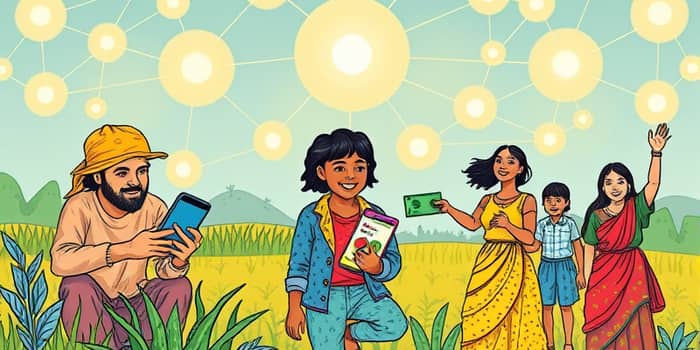
As financial services transform through technology and policy, the potential to uplift billions hinges on our collective commitment. From sweeping digital revolutions in Sub-Saharan Africa to nascent programs in fragile economies, the time is now to ensure every dollar fosters resilience, equity, and opportunity.
Over the past decade, remarkable strides have broadened access. Today, 79% of adults globally hold a financial account, compared to just 62% in 2014. In low- and middle-income countries, this figure has climbed to 75%, a testament to concerted efforts by governments, fintech innovators, and development agencies.
Digital channels have been pivotal. By 2024, 62% of adults worldwide made or received a digital payment, with 42% using it for store or online purchases. Formal savings in LMICs jumped from 25% to 40% between 2021 and 2024, laying the foundation for household resilience and economic growth.
Despite these gains, 1.6 billion adults remain unbanked or underbanked. Rural residents, the poorest households, women, smallholder farmers, and informal workers still face formidable barriers. In 65 economies, gender gaps exceed 20 percentage points, and nearly 16% of adults lack a mobile phone altogether.
Financial confidence lags behind access: between 33% and 59% of unbanked adults would require assistance to use formal accounts safely. Closing these divides demands targeted interventions, combining technology with education and infrastructure investment.
Fintech breakthroughs are rewriting the script for inclusive finance. Mobile money, agent banking, instant payments, open banking, and digital IDs have propelled growth, especially in Asia and Africa. Buy Now Pay Later services processed $350 billion in 2024, while peer-to-peer and marketplace lending reached $62 billion, channeling capital to households and entrepreneurs alike.
In Sub-Saharan Africa, fintech funding for micro and small enterprises soared from 13% to 88% of all fintech investments between 2020 and 2023. In many markets, fintech firms now issue more unsecured personal loans than traditional banks, expanding credit access but also elevating risk.
The narrative is shifting from mere access to broader financial health and resilience. Formal savings, insurance products, and emergency funds are essential buffers against shocks, from medical emergencies to climate disasters. Yet nearly half of adults in developing economies admit they could not cover one month’s expenses in a crisis.
Programs encouraging small, regular savings—often through mobile wallets—have demonstrated that even modest balances can empower families to seize opportunities and weather downturns. By reinforcing savings habits, we lay the groundwork for long-term stability.
As inclusion accelerates, so do potential pitfalls: over-indebtedness, predatory lending, fraud, and identity theft. Low financial and digital literacy exacerbate these threats, especially among vulnerable populations. Responsible finance must therefore guard against harm, ensuring products align with users’ needs and capacity.
Products must deliver real value aligned with user needs, and lenders must uphold transparency and fairness. Regulatory frameworks, consumer protection laws, and industry codes of conduct are vital to foster trust and sustainable growth.
Collaboration among regulators, fintech firms, banks, and civil society is crucial to build frameworks that balance innovation with oversight, preventing abuses while unlocking opportunities.
Policy makers are evolving strategies to keep pace with rapid change. The G20 Data Gaps Initiative-3 advocates for better measurement of fintech-enabled inclusion, informing evidence-based interventions. Digital ID schemes and open banking standards are emerging as cornerstones for secure, scalable financial ecosystems.
Integration of financial health, climate resilience, and gender equity in policy design amplifies impact. By 2030, 86% of the world’s lowest-income individuals will reside in fragile economies, making adaptive, outcome-focused approaches more urgent than ever.
The journey from access to impact demands a relentless focus on outcomes. We must design solutions that not only open doors but also elevate livelihoods, bolster resilience, and promote equity. By measuring success in terms of long-term financial well-being—not just account ownership—we align goals with human aspirations.
Financial inclusion is not a destination but a means to broader development. It underpins climate adaptation, gender equality, and poverty reduction. As communities harness technology and policy evolves, our collective challenge is to steer progress responsibly, ensuring that no one is left behind.
Ultimately, making money work for everyone requires more than innovation; it demands empathy, foresight, and shared accountability. By championing financial confidence, fostering literacy, enforcing responsible practices, and linking inclusion to resilience, we can transform financial systems into engines of opportunity and stability for all.
References





